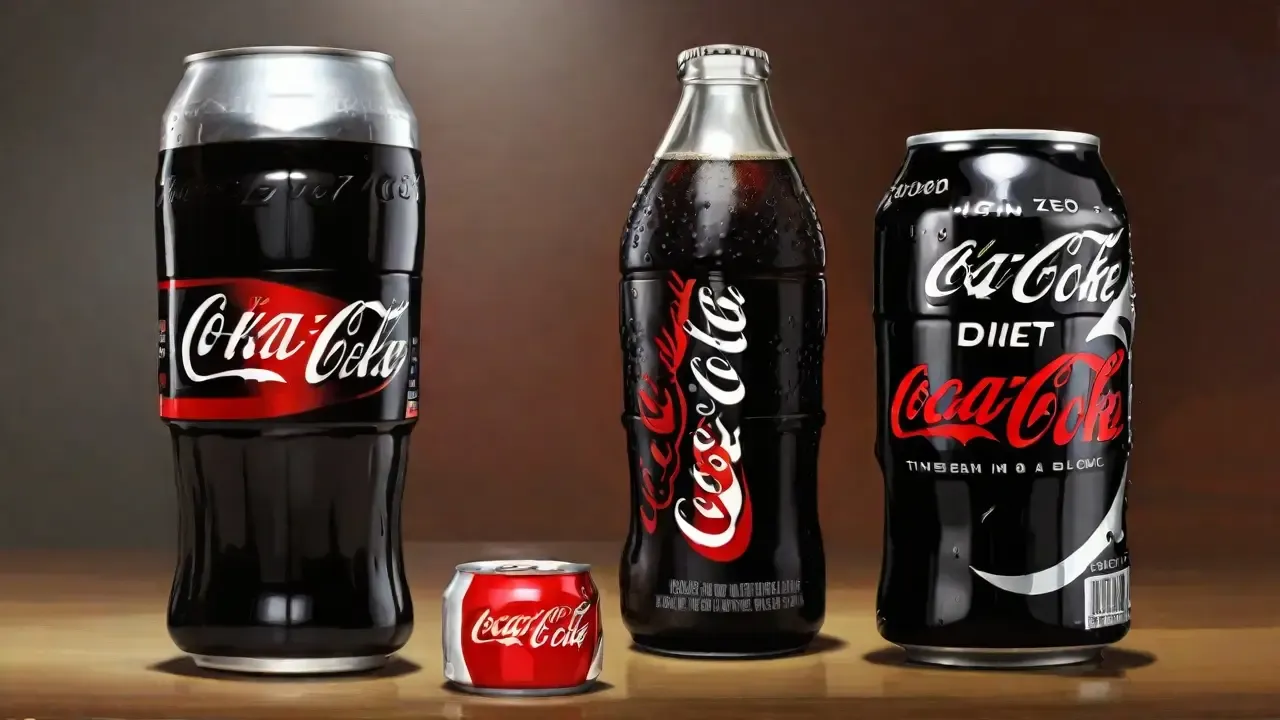Coke Zero vs Diet Coke:
If you're a soda enthusiast looking to cut down on calories and sugar, you've likely encountered the perennial debate: Coke Zero vs. Diet Coke. These two low-calorie cola options have been competing for the attention of health-conscious consumers for years. In this comprehensive guide, we will break down the key differences between Coke Zero and Diet Coke, helping you make an informed choice that suits your taste and dietary preferences.
 |
| Coke Zero vs Diet Coke |
Table of Contents
- 1. Taste and Flavor
- 2. Ingredients
- 3. Sweeteners
- 4. Nutritional Comparison
- 5. Caffeine Content
- 6. Health Considerations
- 7. Frequently Asked Questions
- 8. Conclusion
1. Taste and Flavor
One of the primary factors that distinguish Coke Zero from Diet Coke is their taste and flavor profile. Coke Zero is often praised for its close resemblance to regular Coca-Cola in terms of taste. It attempts to replicate the classic Coke flavor while providing a sugar-free experience.
In contrast, Diet Coke has a slightly different taste. Some people describe it as having a crisper and lighter flavor profile compared to Coke Zero. The taste of Diet Coke has evolved over the years, and it now features a blend of artificial sweeteners to mimic the sweetness of regular Coca-Cola.
2. Ingredients
The ingredients in these two beverages play a crucial role in differentiating them. Both Coke Zero and Diet Coke are sugar-free, making them suitable options for those monitoring their sugar intake. However, the specific artificial sweeteners used vary.
Coke Zero primarily uses aspartame and acesulfame potassium as sweeteners. Aspartame is a well-known low-calorie sweetener, while acesulfame potassium enhances the sweetness without adding calories.
Diet Coke, on the other hand, contains aspartame as its primary sweetener but also includes saccharin and cyclamate in some regions. These additional sweeteners contribute to Diet Coke's distinct flavor.
3. Sweeteners
The choice of sweeteners can be a decisive factor for consumers with specific taste preferences or concerns about artificial additives. Aspartame, found in both beverages, is generally recognized as safe by regulatory authorities worldwide. However, some individuals may have concerns about its use.
Acesulfame potassium, another sweetener in Coke Zero, is also considered safe for consumption by regulatory agencies. It is heat-stable, making it suitable for use in a wide range of food and beverage products.
Diet Coke's additional sweeteners, saccharin and cyclamate, have faced scrutiny in the past, but they are approved for use in many countries. It's worth noting that taste perception can vary, and some individuals may prefer one set of sweeteners over the other.
4. Nutritional Comparison
When comparing the nutritional profiles of Coke Zero and Diet Coke, both beverages share some similarities due to their low-calorie and sugar-free nature.
Typically, a 12-ounce (355 ml) can of Coke Zero contains:
- Calories: 0
- Total Fat: 0g
- Sodium: 40mg
- Total Carbohydrates: 0g
- Protein: 0g
Meanwhile, a 12-ounce (355 ml) can of Diet Coke contains similar nutritional values:
- Calories: 0
- Total Fat: 0g
- Sodium: 40mg
- Total Carbohydrates: 0g
- Protein: 0g
Both beverages are essentially calorie-free and have no fat, carbohydrates, or protein. They are also low in sodium, making them suitable options for individuals watching their salt intake.
5. Caffeine Content
Another critical aspect to consider when choosing between Coke Zero and Diet Coke is their caffeine content. Caffeine is a stimulant found in many beverages, including cola, and can affect individuals differently.
A 12-ounce (355 ml) can of Coke Zero typically contains around 34 milligrams of caffeine. In contrast, the same amount of Diet Coke contains approximately 46 milligrams of caffeine. This means that Diet Coke has slightly more caffeine than Coke Zero.
If you're sensitive to caffeine or trying to limit your intake, this difference may influence your choice between the two.
6. Health Considerations
Both Coke Zero and Diet Coke are marketed as healthier alternatives to regular soda due to their lack of calories and sugar. However, it's essential to consider various health aspects before making a choice.
These considerations include:
- Weight Management: Both beverages can be part of a calorie-controlled diet, potentially aiding in weight management.
- Dental Health: The acidity and carbonation in cola beverages can impact dental health. It's advisable to consume them in moderation and practice good oral hygiene.
- Caffeine Sensitivity: If you're sensitive to caffeine, consider the caffeine content when making your selection.
- Sweetener Preferences: Your taste preferences and any concerns about artificial sweeteners may influence your choice between the two.
7. Frequently Asked Questions
Q1: Which is sweeter, Coke Zero or Diet Coke?
A1: Diet Coke is generally considered slightly sweeter than Coke Zero due to the additional sweeteners used in its formulation.
Q2: Are there any health risks associated with artificial sweeteners in these sodas?
A2: Regulatory authorities have approved the use of the sweeteners in Coke Zero and Diet Coke as safe for consumption. However, individual tolerance and preferences may vary .
Q3: Can these sodas be part of a weight loss plan?
A3: Yes, both Coke Zero and Diet Coke are low in calories and can be included in a calorie-controlled diet as an alternative to regular sugary sodas.
8. Conclusion
In the Coke Zero vs. Diet Coke showdown, the choice ultimately comes down to your taste preferences and specific dietary considerations. Coke Zero aims to replicate the classic Coca-Cola taste, while Diet Coke offers a slightly different flavor profile. Both beverages are calorie-free, sugar-free, and low in sodium, making them suitable options for those looking to reduce their sugar intake.
Consider your caffeine sensitivity, sweetener preferences, and overall health goals when making your selection. Whichever you choose, moderation is key to maintaining a balanced and healthy lifestyle. Enjoy your low-calorie cola responsibly!
Remember that staying hydrated with water should always be your top priority, but when you're craving a fizzy indulgence, Coke Zero and Diet Coke are there to satisfy your taste buds without the guilt.


